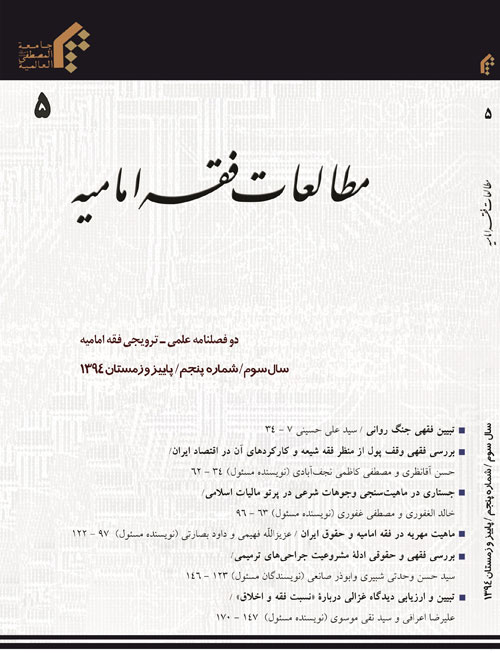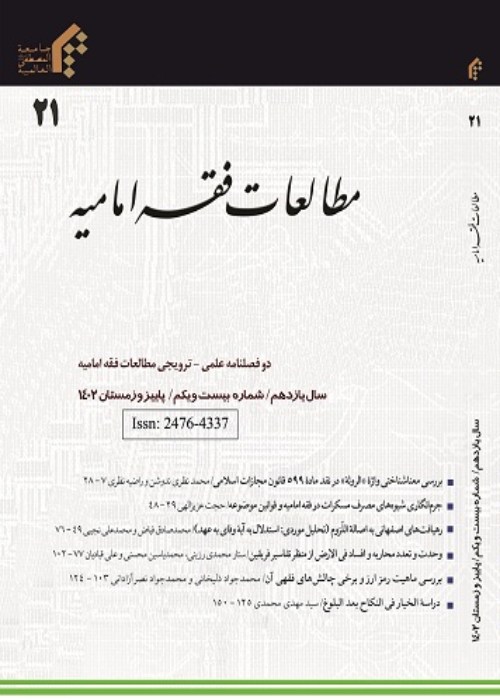فهرست مطالب

مجله مطالعات فقه امامیه
پیاپی 5 (پاییز و زمستان 1394)
- تاریخ انتشار: 1394/12/12
- تعداد عناوین: 6
-
-
صفحات 5-34جنگ روانی با توجه به پیشرفت شگفت انگیزی که در عرصه فناوری ارتباطات رخ داده است، به کارآمدترین و مهم ترین ابزار در خدمت منافع و مقاصد دولت ها تبدیل شده است. جنگ روانی با عنایت به این مفاهیم که بهترین سیاست ها در جنگ، تسخیر سرزمین بدون خونریزی است و اینکه بالاترین هنر، پیروزی در نبرد نیست، بلکه تسلیم کردن دشمن بدون پیکار و خونریزی است، پارادایمی نو در عرصه روابط بین الملل ایجاد کرده است. جنگ روانی به اندازه ای حائز اهمیت است که سطح تخریب و ویرانی در این گونه تهاجم ها و تجاوزها به شدت بالاتر و سهمگین تر از جنگ سخت است و می تواند در فاصله زمانی کوتاه موجب اختلال و برهم خوردن نظم عمومی جامعه و از بین رفتن استقلال کشور و در نتیجه تسلیم در مقابل دشمن شود. به سبب این اهمیت لازم است ابعاد و زوایای مختلف جنگ روانی مورد تحلیل فقهی قرار گیرد. در مقاله حاضر با تتبع در آیات قرآن و روایات، وجوب جنگ روانی در برابر دشمن اثبات شده است و نیز دلیل عقل و اجماع در این باره بررسی شده و برای اثبات وجوب آن به قاعده فقهی اختلال نظام نیز تمسک شده است.کلیدواژگان: جنگ روانی، فقه، خدعه، تاکتیک های جنگ روانی، اختلال نظام، نفی سبیل
-
صفحات 35-62
-
صفحات 63-96وجوهات شرعی اصطلاحی فقهی نیست، بلکه یک واژه عرفی، و دارای دو معنای اعم و اخص است که در معنای اعم تمام حقوق مالی اسلامی را شامل می گردد و در معنای اخص حقوق مالی با ماهیت مالیات گونه را در بر می گیرد که اصطلاحا بدان مالیات اسلامی نیز گفته می شود. در این مقال با بررسی وجوهات شرعی به معنای اخص در صدد جست وجوی حقیقت و ماهیت آن برآمده ایم تا از رهگذر سخن فقها بتوانیم عرصه مالیات های اسلامی را روشن تر از گذشته احصا و در جهت همگام سازی اقتصاد و فرهنگ با حل معضلات اقتصادی به ویژه در عرصه مالیات حرکت نماییم.کلیدواژگان: وجوهات شرعی، ماهیت سنجی، خمس، زکات
-
صفحات 97-122فقی هان به طور مستقل و واضح به ماهیت مهر نپرداخته اند، اما زمینه آن را می توان در لابه لای کلام آنان شناسایی کرد؛ از این رو، در حقوق نیز چیستی مهریه با نوعی پیچیدگی همراه است. امروزه مهریه از محتوای اصلی خود منحرف و از اصل شرع دور شده است؛ مثلا عده ای میزان آن را موقع عقد نکاح خیلی هنگفت می گیرند یا برخی دیگر وجود مهریه را عاملی برای کالا دانستن زن در برابر عوض و مخدوش شدن کرامت وی تلقی می کنند. منشا عمده این برداشت ها، فقدان دیدگاه صحیح درباره ماهیت مهریه است. با توجه به نشانه های موجود در فقه، مهریه نقش عوض را ندارد - هرچند عقد نکاح نزد قاطبه فقها یک عقد شبه معاوضی محسوب می شود - بلکه یک هدیه و پیشکش شرعی است که با اهداف معنوی همچون تکریم زوجه همراه است.کلیدواژگان: مهریه، ماهیت فقهی، ماهیت حقوقی، هدیه، عوض
-
صفحات 123-146دانش جراحی پلاستیک یکی از دستاوردهای جدید علم پزشکی بوده که به دو گروه روشی «زیبایی و ترمیمی» تقسیم شده است. سوال محوری این مقاله درباره ادله فقهی و حقوقی مشروعیت جراحی ترمیمی است که بعد از بررسی مستندات آن مشخص شد: تمامی فقهای شیعه معتقد به اباحه نفس این عمل به سبب ادله زیر هستند: 1. اخبار جواز درمان، مستلزم مشروعیت روش درمانی جراحی و به هدف ترمیم است. 2. حکم عقل به وجوب دفع ضرر، مستلزم دفع زیان بیماری های نیازمند به ترمیم است. 3. قاعده نفی عسر و حرج، مستلزم دفع تحمل سختی بیماری های نیازمند به ترمیم است. 4. وجود ضرورت، دلیل اصلی اباحه فعالیت های پزشکی (مثل جراحی ترمیمی) است. عدم تحقق عنوان تغییر خلقت اولیه بر جراحی ترمیمی، دلیل دیگری بر جواز آن است.کلیدواژگان: جراحی، ترمیمی، فقه، حقوق، مشروعیت
-
صفحات 147-170بی شک غزالی شخصیتی مهم و اثرگذار است که آثار مختلفی از وی به جا مانده است. برخی از آرای غزالی مانند دنیوی دانستن فقه و انتقاد از فقه و فقی هان در دفاع از اخلاق و توجه به باطن و آخرت ، به دفعات در آثار روشنفکران دینی برای نقد فقه و مقدم دانستن اخلاق، مورد تمسک قرار گرفته است. بازخوانی دقیق آرای غزالی در باب نسبت فقه و اخلاق و ارزیابی آن دستور کار نوشتار حاضر است. در ابتدا «گزارشی از دیدگاه غزالی» ارائه شد و سپس به «صورت بندی دیدگاه وی» اقدام شد و چارچوبی مفهومی و نظری برای دیدگاه وی طراحی شد. در ادامه در دو محور «نقد صغروی» و «نقد کبروی» دیدگاه غزالی مورد ارزیابی قرار گرفت.کلیدواژگان: فقه و اخلاق، دین و اخلاق، اخلاق اسلامی، غزالی
-
Pages 5-34Keeping in view the amazing advancements made in telecommunications, psychological warfare has turned into one of the most efficient and most important tools serving the cause and objectives of the states. Psychological warfare is the use of propaganda, threats, and other psychological techniques to mislead, intimidate, demoralize, or otherwise influence the thinking or behavior of an opponent. It is a tactic that aims to demoralize the enemy in an attempt to ensure victory, possibly without bloodshed. It has created a new paradigm in international relationships. Psychological warfare is so important that it can leave much more destruction and impact than a real confrontation because it subverts confidence and in a short time leads to chaos and public disorder ultimately resulting in a country losing its independence and surrendering to the enemy. It is because of this great significance that it is necessary that various angles and aspects of psychological warfare be analyzed. In this study which delves into Quranic verses and prophetic traditions, the necessity of psychological warfare to be used against the enemy has been proven. As well, rational arguments and consensus have been examined in this regard and recourse has been taken to the prohibition of public disorder as a jurisprudential principle to prove the necessity of psychological warfare.Keywords: psychological warfare, trick, tactics, public disorder, rejection of domination
-
Pages 63-96Religious dues is not a jurisprudential phrase but a term used by people in two general and specific meanings. The general meaning includes all forms of Islamic financial rights and the specific meaning includes the financial rights with a taxation nature technically called Islamic tax. This study seeks to examine religious dues in its specific meaning in a bid to explore its reality and nature so that by so doing the concept of Islamic taxes could be further clarified towards creating harmony between economy and culture and finally resolving economic dilemmas especially in the area of taxes.Keywords: religious dues, inquiry, nature, khums, zakat
-
Pages 97-122Jurisprudents have not dealt clearly and independently with the nature of dowry (marriage gift) but the groundwork can somehow be identified in their studies. Thus, the study of dowry is coupled with some complexity in law. Now-a-days, dowry has become a pressure practice to appease the bride's family; thus it has lost its main content and distanced from Shariah. For example, some people are bent to receive a huge amount of money during marriage contract (nikah) while others consider dowry to be a reason for considering women as commodity that can be sold in an exchange for something. They believe dowry is in contravention with woman's intrinsic dignity. These diverse notions are mainly due to a lack of proper understanding about the nature of dowry. In view of the existing signs in jurisprudence, dowry is not an exchange nor is a woman to be considered as a chattel, though the marriage contract is a quasi-exchange contract. In fact, the dowry is a legally endorsed gift given to wife to uphold her dignity.Keywords: dowry, jurisprudential nature, legal nature, gift, exchange
-
Pages 123-146Plastic surgery is one of the modern scientific achievements. There are two kinds of plastic surgery: cosmetic and reconstructive. The focal question in this article is about the legal and juridical arguments on the legality or permissibility of reconstructive surgery. After verifying the references, it was concluded that all Shiite jurisprudents allow this kind of surgery due to the following reasons:1. The reports on the permissibility of treatment also includes treatment surgery with the reconstruction purpose.
2. The human reason considers it necessary to avert harm as well as the harm that may come from illness that needs reconstruction.
3. The principle of 'no unbearable difficulty' allows us to avert the difficulty of illnesses that requires reconstruction.
4. Necessity is the main reason for permissibility of medical activity (such as reconstructive surgery).
The non-materialization of change in the primary creation as a result of reconstructive surgery is yet another reason for its permissibility.Keywords: surgery, reconstructive, jurisprudence, law, permissibility -
Pages 147-170There is no doubt that Ghazālī is one of the important and notable scholars who left different works behind. Some of Ghazālī''s views such as the fiqh being worldly¡ criticizing jurisprudence and jurisprudents to defend ethics and focusing on the inner aspect of the human being as well as the afterworld have been criticized by Muslim intellectuals. Ghazālī gives precedence to morality over jurisprudence. This article seeks to reread and reassess Ghazali''s perspective on the relationship between jurisprudence and morality. At first¡ it provides a report from Ghazālī''s viewpoint and then it formulates his view and works out a conceptual and theoretical framework of his perspective. In continuation¡ the major and minor premises of Ghazālī''s viewpoint have been assessed.Keywords: jurisprudence, ethics, religion, morality, Islamic morality, Ghazālī


